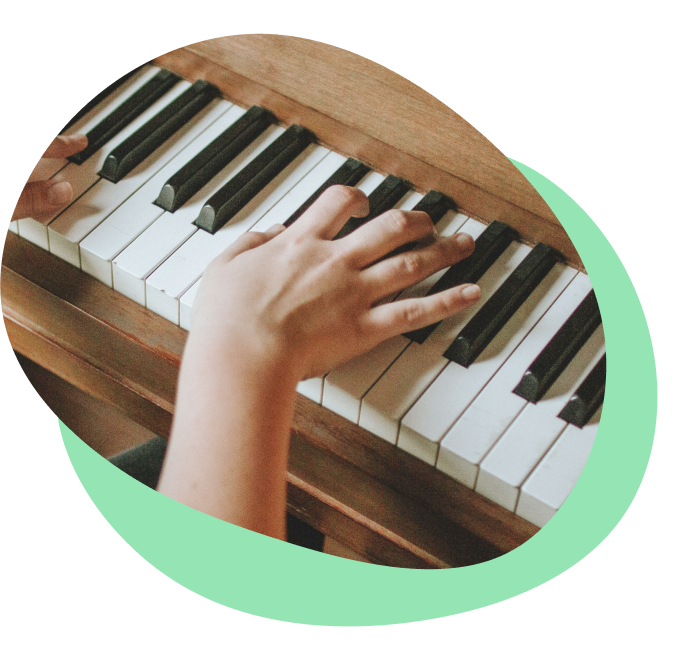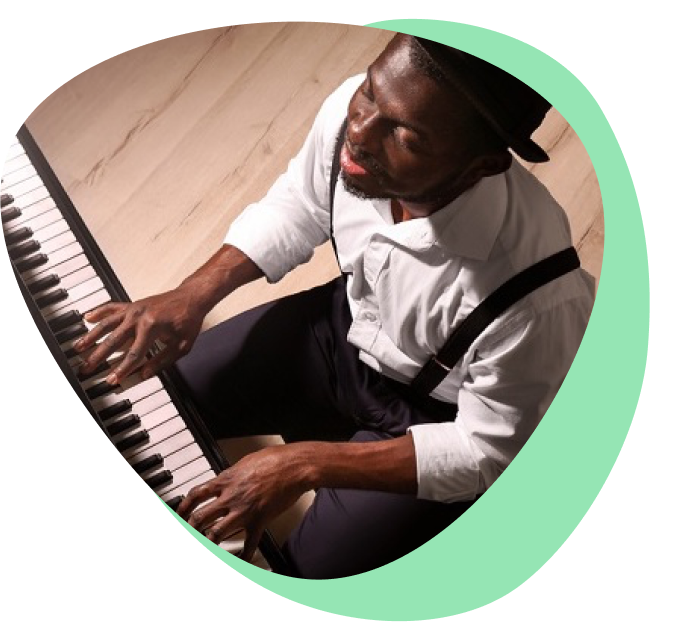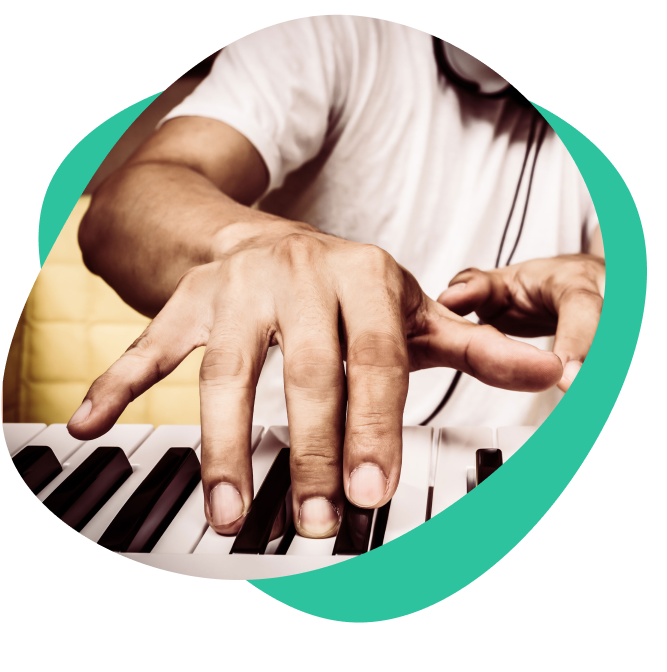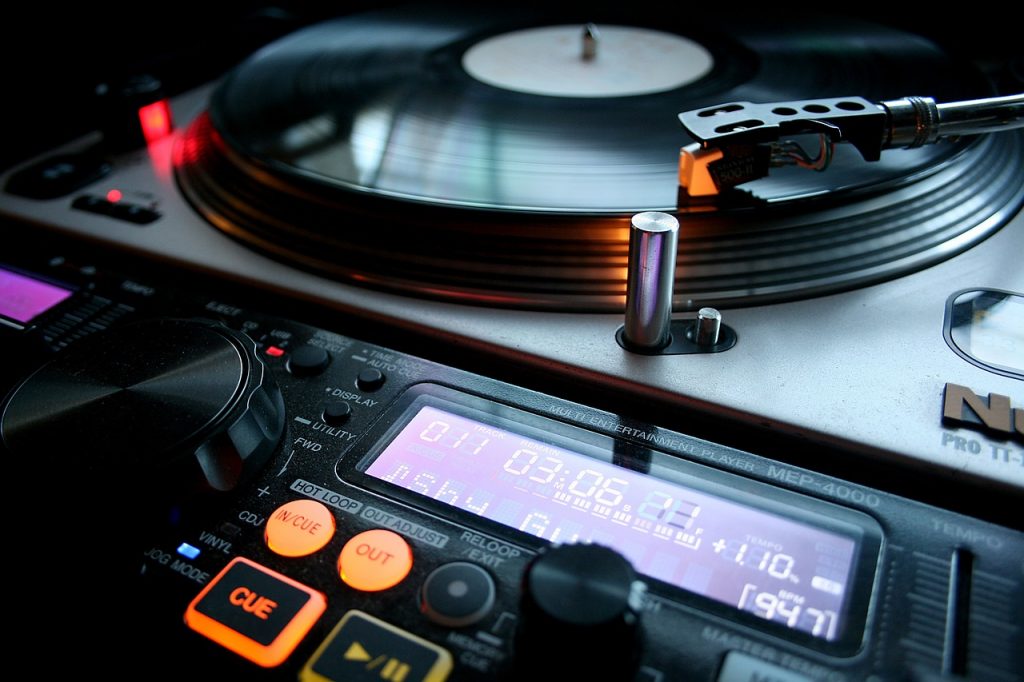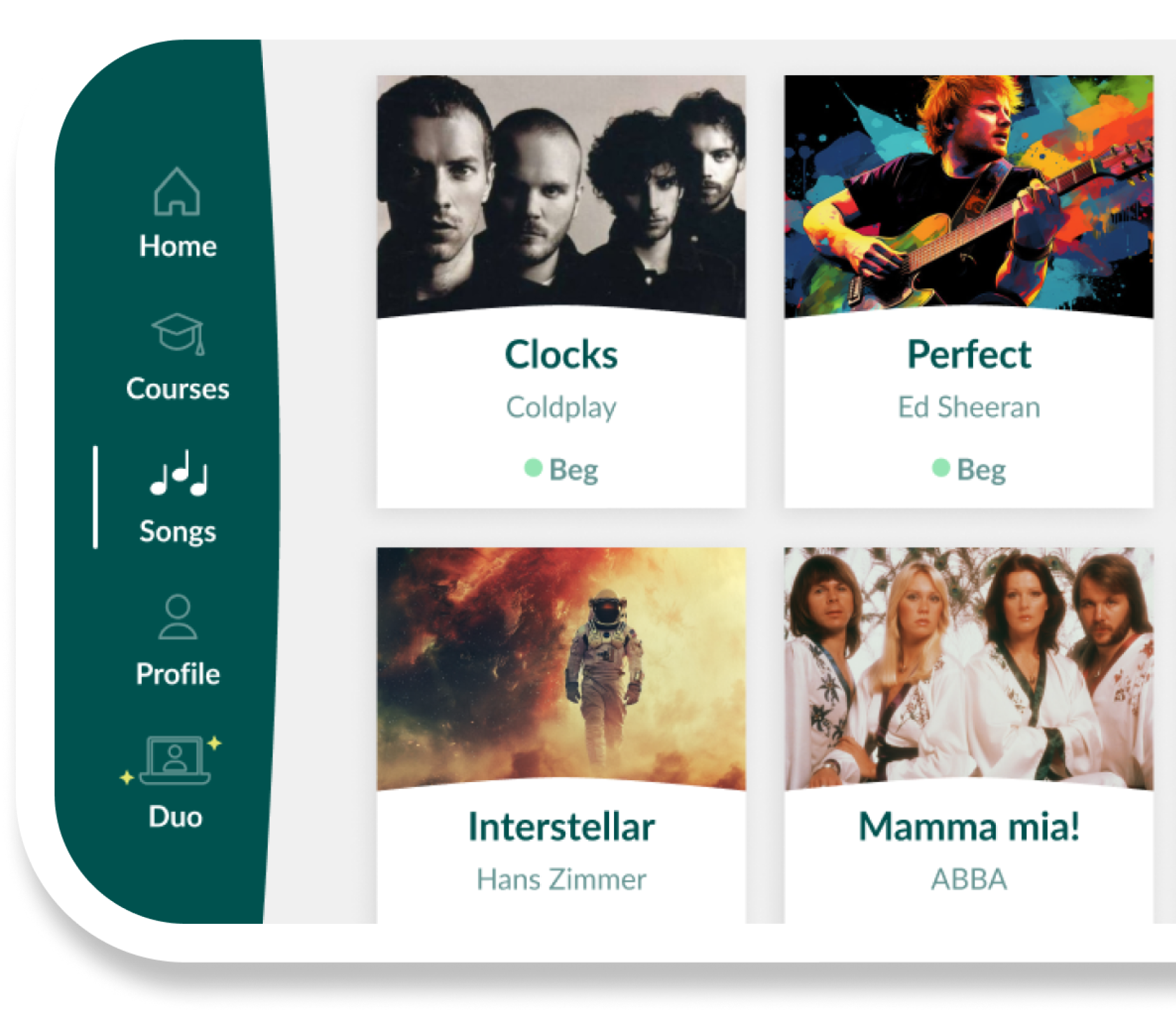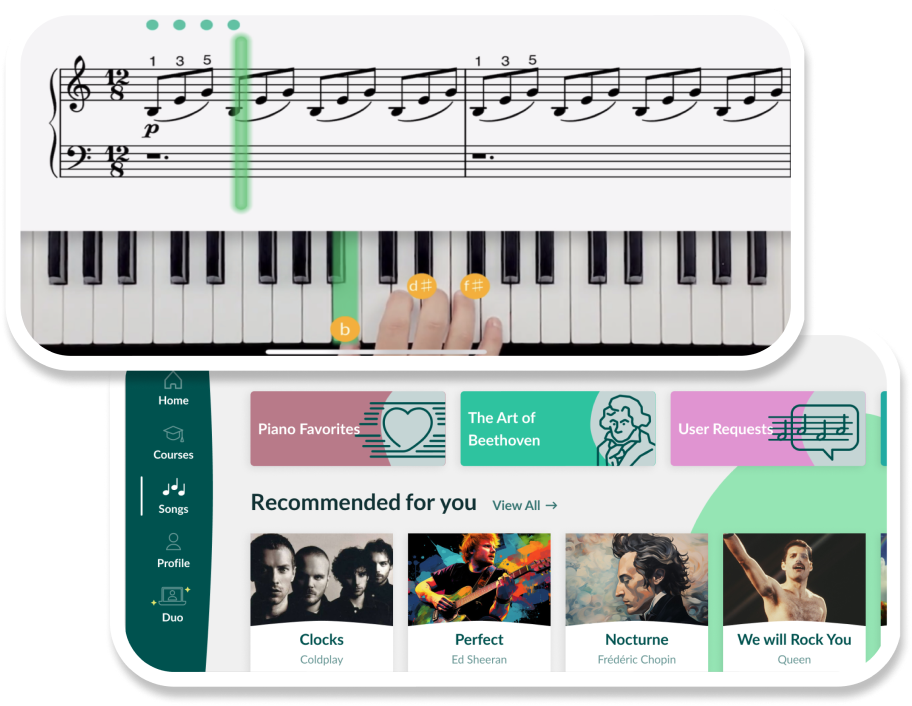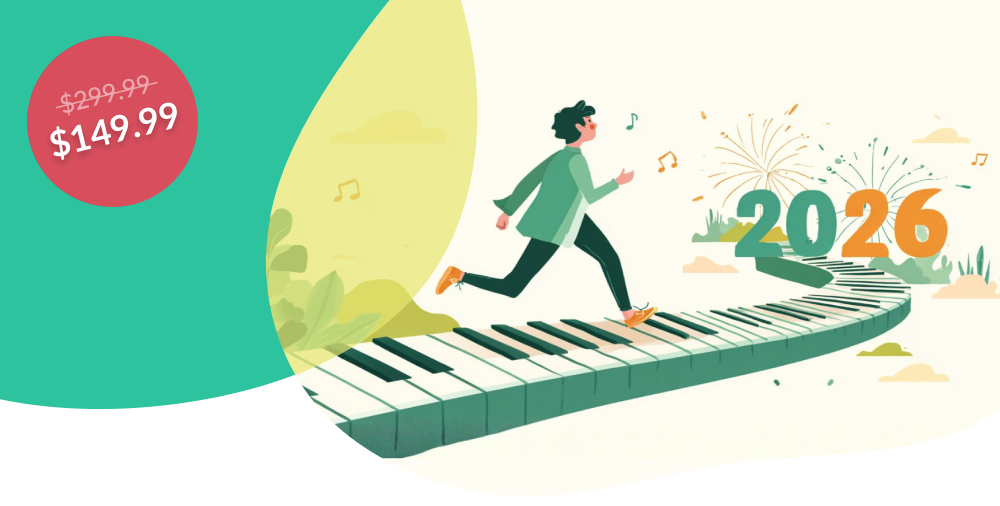In recent months, the focus on the role and potential for Artificial Intelligence (AI) in the music industry has taken center stage. Whether in music production, composition, selection, or education, the possibilities of AI are being investigated at many levels, with the potential to completely redefine creativity and education in the process.
Let’s take a look at what AI in music really means and some of the ways AI is already influencing music creation and education.
- Fall in love with the music - Learn your favorite songs, at a level suitable for you.
- Enjoy interactive piano lessons - Explore courses covering music theory, technique chords & more.
- Get real-time feedback - Skoove's feedback tells you what went well and what needs practice.
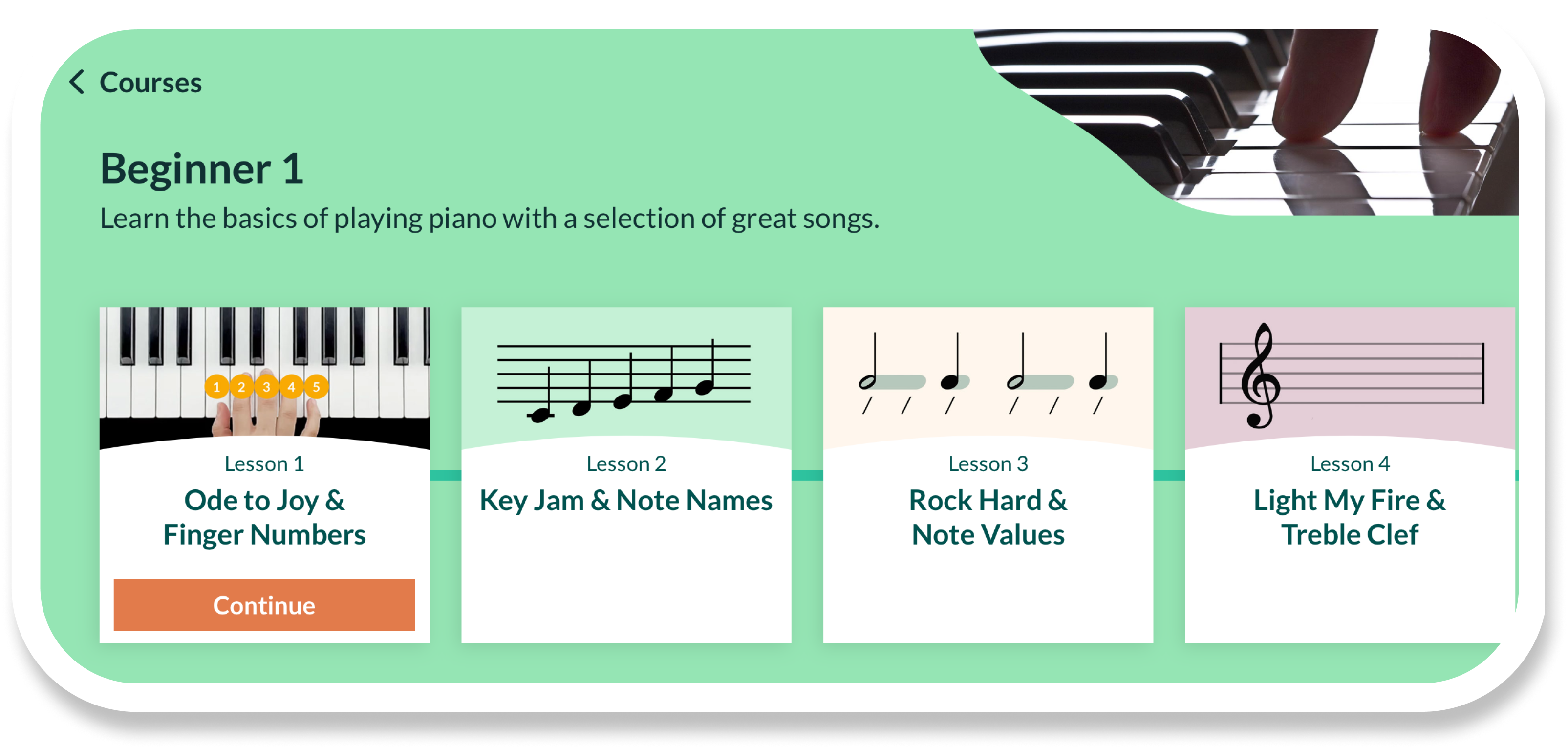
Understanding the role of AI in music
In our quest to comprehend the intricacies of AI in music, let us first set the stage by defining what exactly we mean by AI in music.
AI in music refers to the utilization of artificial intelligence techniques and technologies to enhance various aspects of music production, composition, and consumption. From generating melodies to analyzing musical patterns, AI algorithms are revolutionizing the way we interact with and create music.
Evolution of AI in music production
We can trace the development of AI in music production back to the early experimentation with computer-generated compositions in the mid-20th century.
However, it wasn’t until the advent of advanced machine learning algorithms and neural networks that AI’s potential in music truly began to unfold.
Today, AI-driven tools are becoming more and more prevalent in modern music production, offering several interesting and groundbreaking features and new ways to help producers and composers develop their visions.
AI in music production
AI’s impact on music production is perhaps the most tangible. It revolutionizes traditional workflows and offers innovative solutions to musicians and producers alike. From sound design to mastering, AI-driven tools streamline production processes, enabling artists to achieve professional-quality results with unprecedented efficiency.
For instance, AI-powered plugins can analyze audio tracks in real time, automatically applying corrective measures, for example tuning a piano sound, to enhance clarity and balance. Similarly, virtual instruments and synthesizers powered by AI algorithms offer an extensive array of sounds and textures.
Furthermore, AI-driven platforms facilitate collaborative workflows, allowing musicians to seamlessly exchange ideas and collaborate regardless of geographical boundaries.
In essence, AI has the potential to democratize music production, empowering artists to realize their creative visions with greater ease and precision.
AI in music composition
AI’s capabilities extend beyond production to music composition, where it is pushing some interesting innovation and experimentation.
By analyzing vast repositories of musical data, AI algorithms can identify patterns, styles, and structures, generating original compositions that resonate with human emotion and creativity.
Algorithmic composition systems leverage AI to autonomously generate melodies, harmonies, and rhythms, providing composers with a wealth of material to explore and refine.
Learn the piano using AI from Skoove
AI in the music industry also impacts music education. Platforms like Skoove are instrumental in this regard for piano enthusiasts. Skoove employs AI to offer personalized piano lessons, making it an invaluable tool for beginners and seasoned players looking to refine their craft.
As learners engage with Skoove’s interactive lessons, they not only master the technical aspects of piano playing but also develop a deeper understanding of composition.
This dual benefit of AI in music education—facilitating skill acquisition and nurturing compositional creativity—is what makes the best piano apps like Skoove, a key player in the modern musical landscape.
AI in music performance and experience
AI is likewise transforming how music is performed and experienced, ushering in a new era of interactive and immersive musical experiences. AI-driven systems can analyze audience reactions in real time, adapting performances to evoke specific feelings in music.
In live settings, AI-powered instruments and controllers enable musicians to explore new sonic territories, leveraging algorithms to manipulate sounds and textures in unprecedented ways.
Moreover, AI-driven music recommendation systems personalize the listening experience, curating playlists based on individual preferences, moods, and contexts. Whether in a concert hall or a virtual environment, AI enriches the musical experience, fostering deeper connections between artists, audiences, and the music itself.
Key technologies driving AI in music
The AI in music boom is powered by a suite of advanced technologies. Let’s explore the core technologies that are driving the developments in AI’s role in music.
Machine learning and neural networks
At the heart of AI music are machine learning algorithms and neural networks, which are adept at identifying patterns in large datasets of music.
These technologies analyze the elements of music including existing compositions, learning from structures, rhythms, and harmonies to generate new music that resonates with the learned styles.
Neural networks, particularly deep learning models, can create complex musical pieces that can mimic the nuances of human composition.
Natural Language Processing (NLP)
Natural Language Processing (NLP) plays a pivotal role in understanding and generating music-related text. It enables AI to interpret lyrics and musical notations, allowing for the creation of songs that not only sound pleasing but also carry meaningful lyrics.
Audio processing technologies
Sophisticated audio processing technologies empower AI to manipulate sound with incredible precision. This includes altering pitch, tempo, and timbre to create unique auditory experiences.
These technologies are developing usefulness in tasks such as audio mastering, where AI can optimize the sound quality of a track to match professional standards.
Generative algorithms
Generative algorithms are the composers in the AI music world. Generative algorithms are used to create original pieces by employing rules and patterns learned from existing music.
They can produce music in various styles, from classical to contemporary, and even generate music that blends multiple genres.
AI music generators and tools
Myriad AI music generators and tools are available, each offering different capabilities. From Meta’s AudioCraft, which allows users to add tunes to videos with text prompts, to OpenAI’s MuseNet, which can pivot between music styles and analyze musical elements, these tools are making AI-generated music more accessible and versatile.
Augmented and Virtual Reality (AR/VR)
AI-powered AR and VR technologies offer immersive experiences that extend beyond mere listening. These tools enable virtual concerts and interactive music videos, creating memorable and shareable moments that deepen the emotional connection between artists and their audiences.
Challenges and controversies
As AI begins to revolutionize the music industry, it brings with it a suite of challenges and controversies for artists, producers, and legal experts alike. Integrating AI in music is not just a technological leap but also a cultural and ethical conundrum.
The debate over creativity and originality
Creativity and originality lies at the core of music, but AI’s ability to generate music has sparked a debate over these values. Critics argue that AI could dilute the essence of music, creating a flood of content that lacks the human touch.
Proponents, however, see AI as a tool that can democratize music creation, making it accessible to all and potentially uncovering new talent.
Legal and ethical challenges in AI-generated music
AI-generated music raises complex legal questions, particularly around copyright and ownership. Who owns an AI-generated piece of music? How do we attribute authorship? Similarly, legal questions about the source content of machine learning algorithms and the rights of original songwriters need to be addressed.
Balancing innovation with artist rights
The music industry must find a balance between embracing AI’s innovative potential and protecting the rights of artists. This includes ensuring fair compensation for creators whose work is used to train AI systems and safeguarding the unique identity and style of artists in the age of digital replication.
Future trends and possibilities
Looking ahead, AI is most likely going to have an outsized impact on music in the coming decades. Let’s examine some of the ways AI might impact our experience of music in the coming years.
Hyper-personalization of music
AI may enable hyper-personalized music experiences, tailor songs to individual tastes and moods. This potentially could transform passive listeners into active participants in the music creation process.
Revolutionizing music production
Fundamental mixing and production skills may become automated, and virtual DJs could master mixing and track selection, leading to a renaissance in how music is produced and experienced.
Ethical conversations
The ethical implications of AI in music will become a central topic of discussion as the industry navigates the delicate balance between technological advancement and human creativity.
The video below shows how AI is revolutionizing the music industry, showing how easy it is to create AI-generated music. Moreover, the video takes you through what some of the professionals in the industry have to say, more so regarding the future of this industry.
Conclusion
AI is already playing an important role in the music industry and the developments in machine learning will likely only continue to play a stronger part in how we create, produce, and experience music
As we have explored, AI’s influence spans from the studio to the stage to the classroom and beyond, offering tools that push the boundaries of creativity and redefine the musical experience.
Platforms like Skoove underscore AI’s educational impact, providing personalized piano lessons that cater to the needs and learning styles of each learner. Let’s hope the focus of AI development remains on the positive uses of these tools and not the replacement of human creativity and innovation.
Author of this blog post:
Susana Pérez Posada

With over seven years of piano education and a deep passion for music therapy, Susana brings a unique blend of expertise to Skoove. A graduate in Music Therapy from SRH Hochschule Heidelberg and an experienced classical pianist from Universidad EAFIT, she infuses her teaching with a holistic approach that transcends traditional piano lessons. Susana’s writings for Skoove combine her rich musical knowledge with engaging storytelling, enriching the learning experience for pianists of all levels. Away from the piano, she loves exploring new places and immersing herself in a good book, believing these diverse experiences enhance her creative teaching style.
Published by Lydia Hovan from the Skoove team




